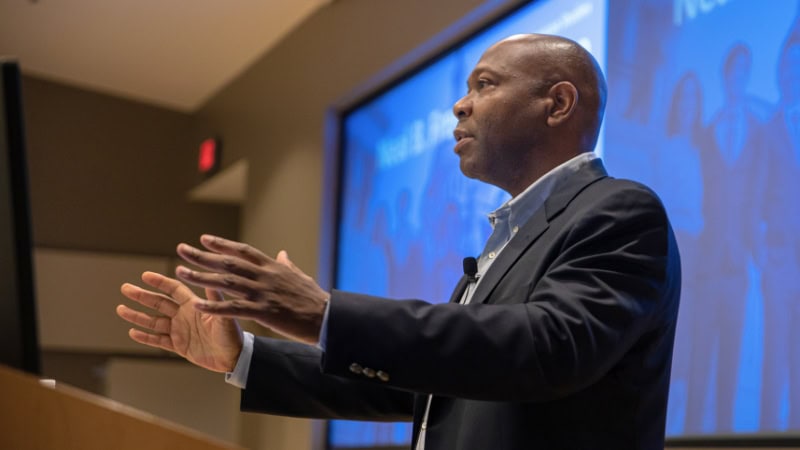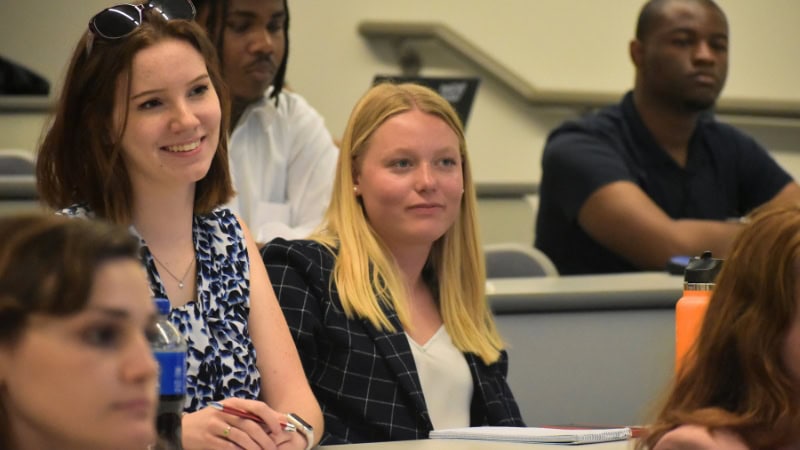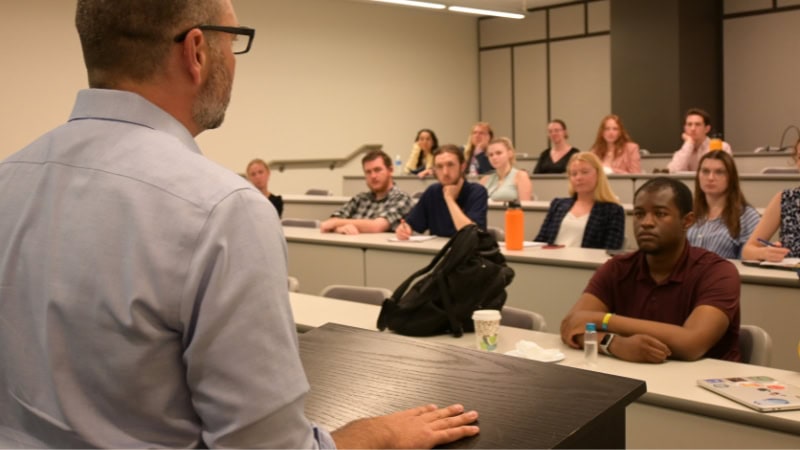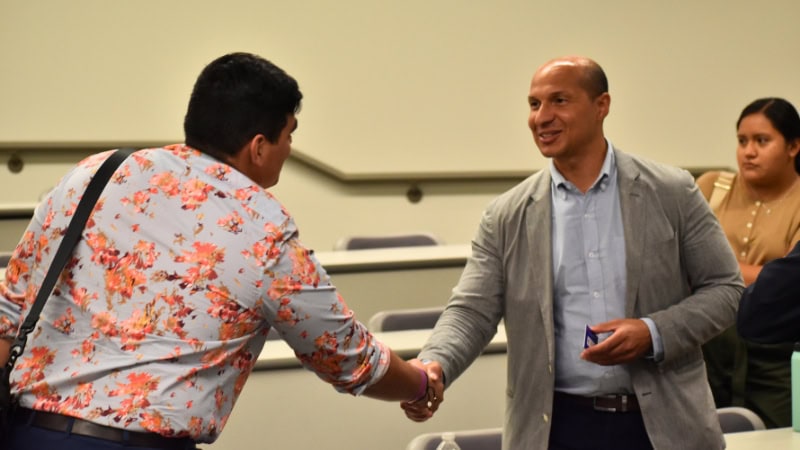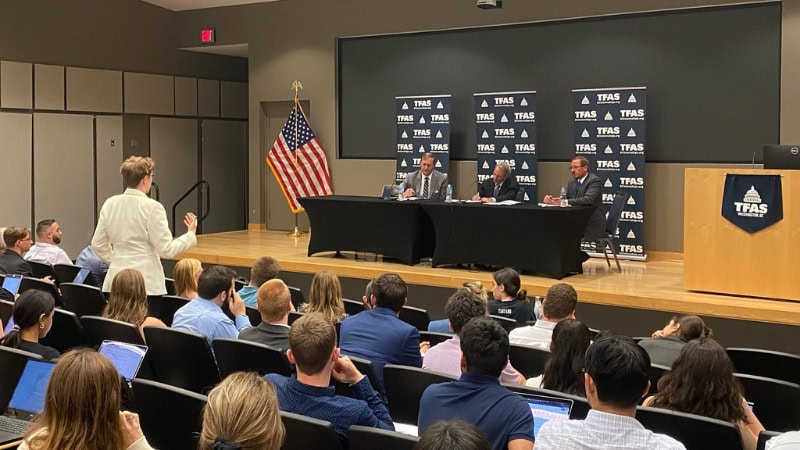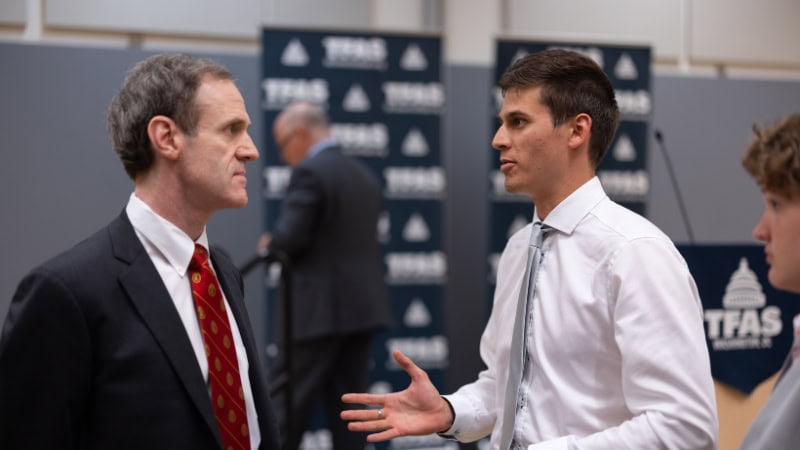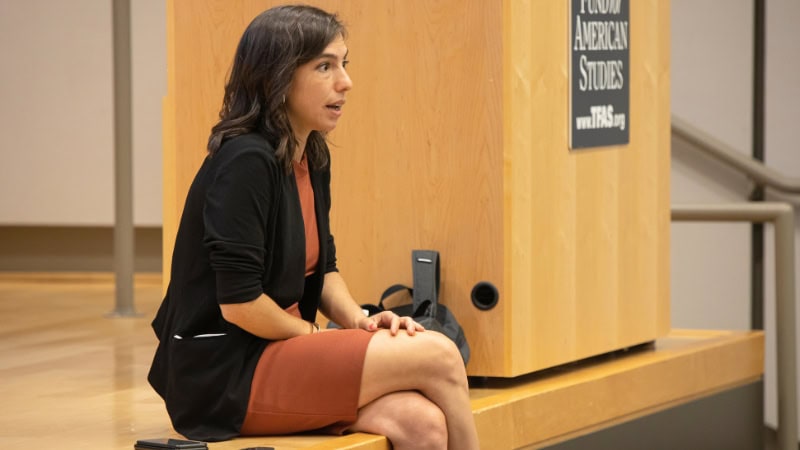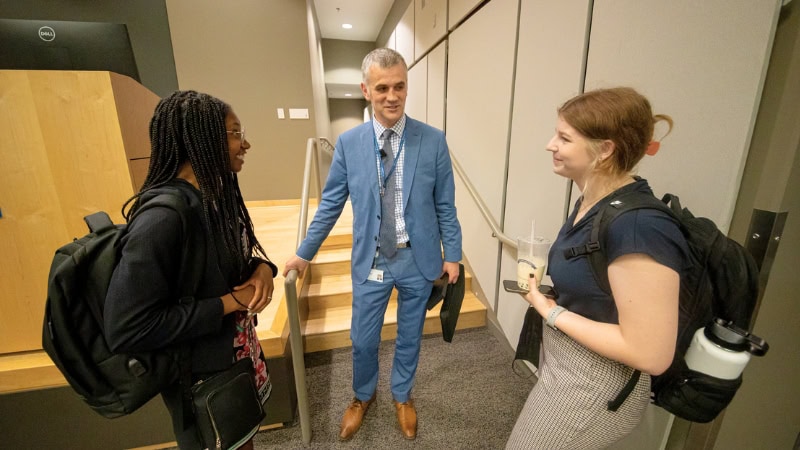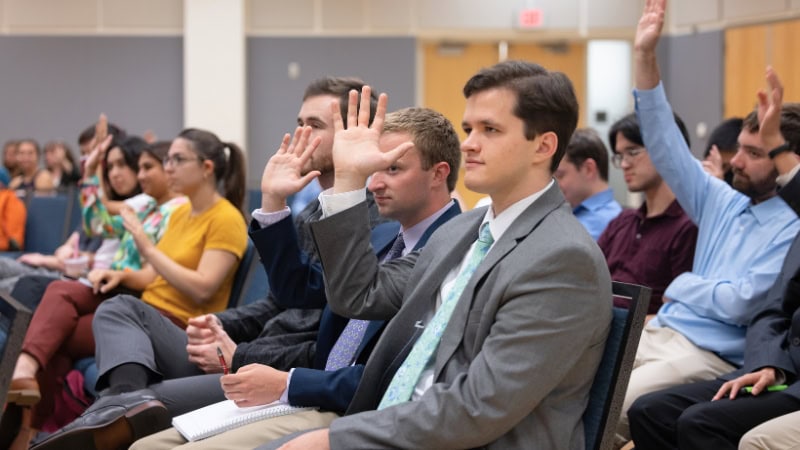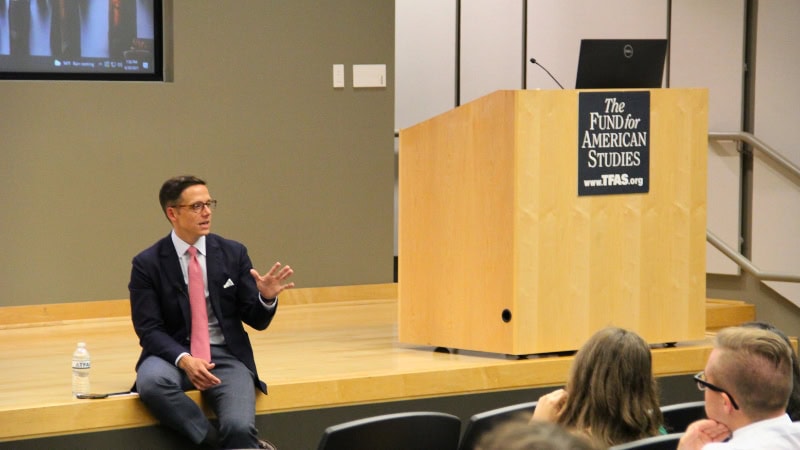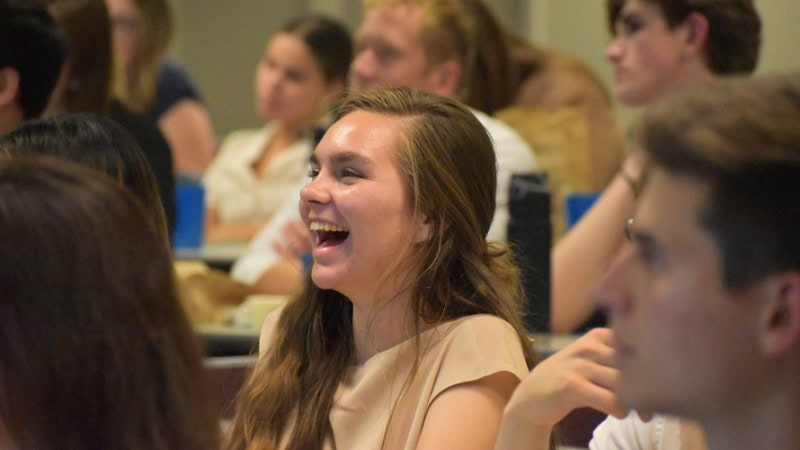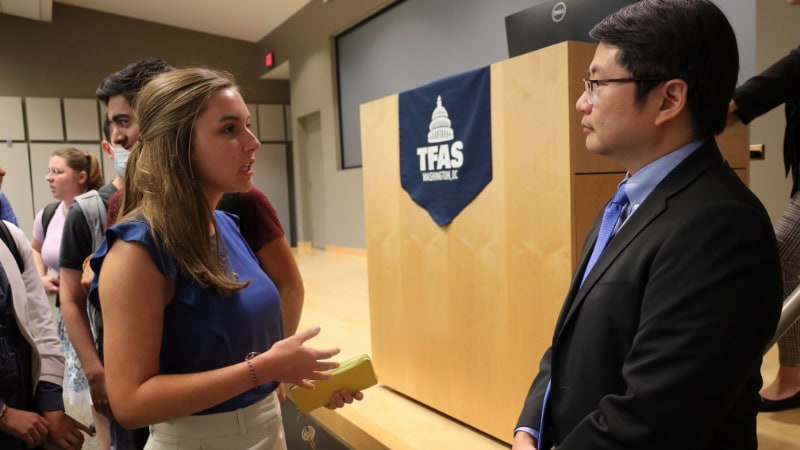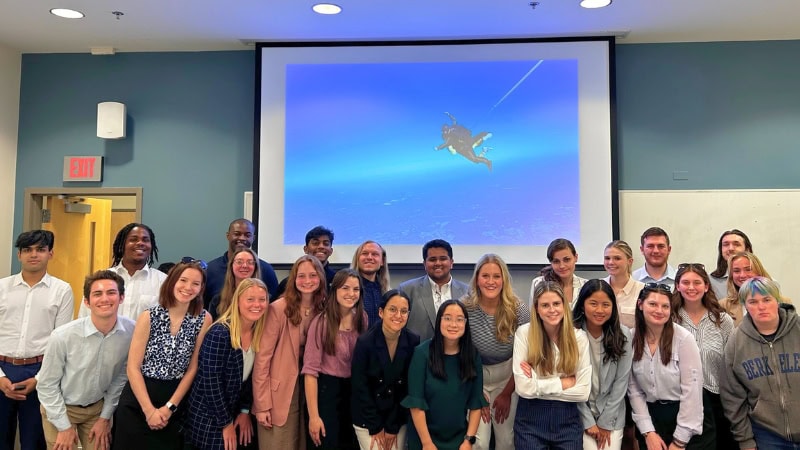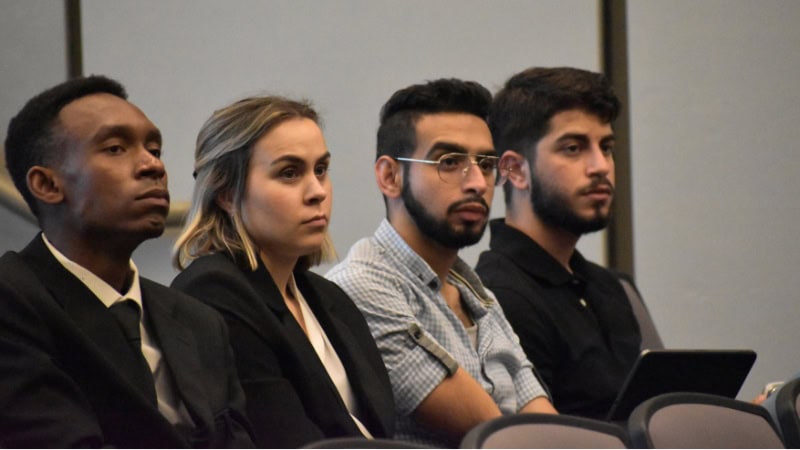Academics
To create a well-rounded summer or semester experience, all students enrolled in TFAS programs take courses for academic credit from George Mason University (GMU). Summer program students are required to take the 3-credit core class and are encouraged to enroll in an elective class for additional credits.
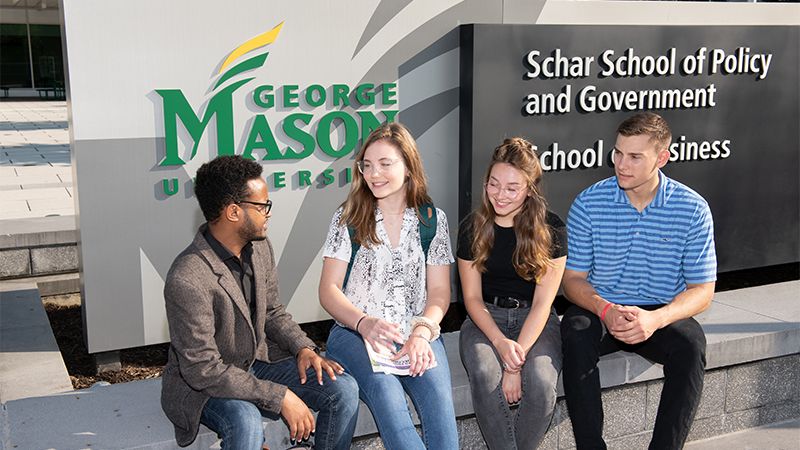
Thought-Provoking Courses
The courses are designed to complement your D.C. internship experience by offering a thorough examination of our free enterprise system and the economic way of thinking. Elective classes cover engaging topics such as American political thought or U.S. foreign policy, as well as an internship seminar.
Unparalleled Learning Spaces
In-person class meetings are held in George Mason University’s state-of-the-art facilities, conveniently located a few Metro stops away from student housing in nearby Arlington, Virginia. GMU has been named one of the top 100 research universities in the U.S. by the Carnegie Classification of Institutions of Higher Education and was recently ranked Number 1 Young University by Times Higher Ed.
Transcript + Transferring Credit
A GMU transcript with grades may be requested from the registrar’s office upon completion of the program. We encourage you to consult your academic advisor and/or registrar’s office to determine how the classes may transfer back to your home institution. Course descriptions and sample syllabi are provided below.
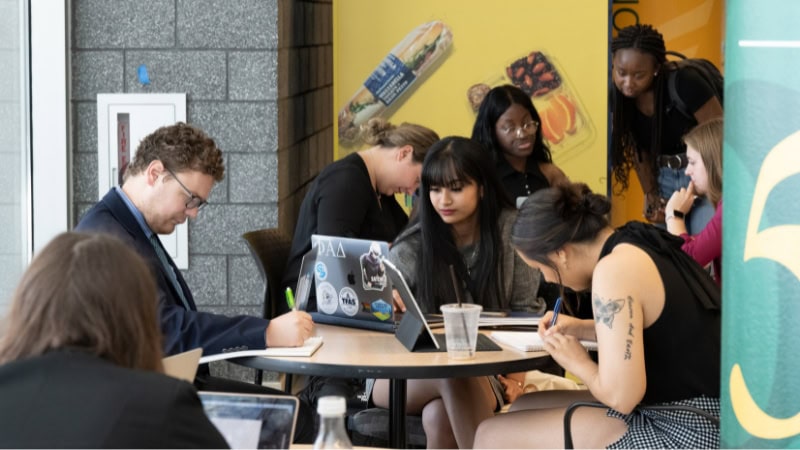
“This class has been a favorite of my academic career. It prompted stimulating discussions and gave me a different insight on economics.”
Paul Costas-Verlasco, University of Florida
Corazon Latino Intern
Economics Courses: Course Descriptions, Syllabi + Faculty Bios
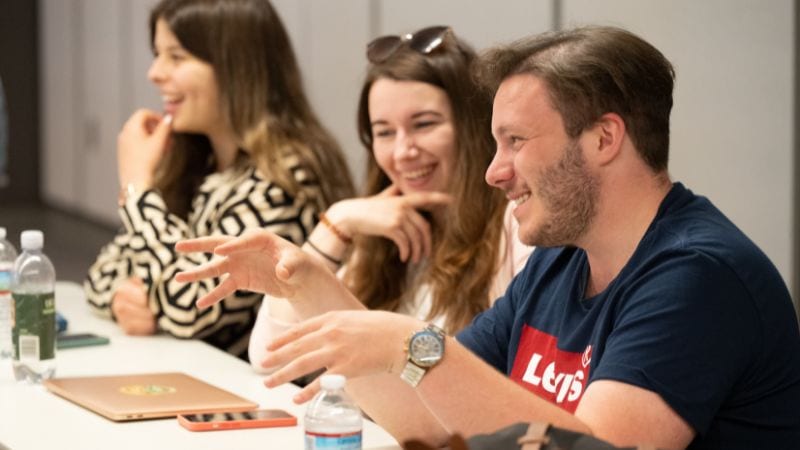
Upon enrollment, students in one of the following summer program tracks will select one of three economics courses offered.
- Public Policy + Economics
- International Affairs
- Journalism + Communications
- Business + Government Relations
Students are encouraged to select the course that best meets their interests and credit transfer requirements.
Course Description
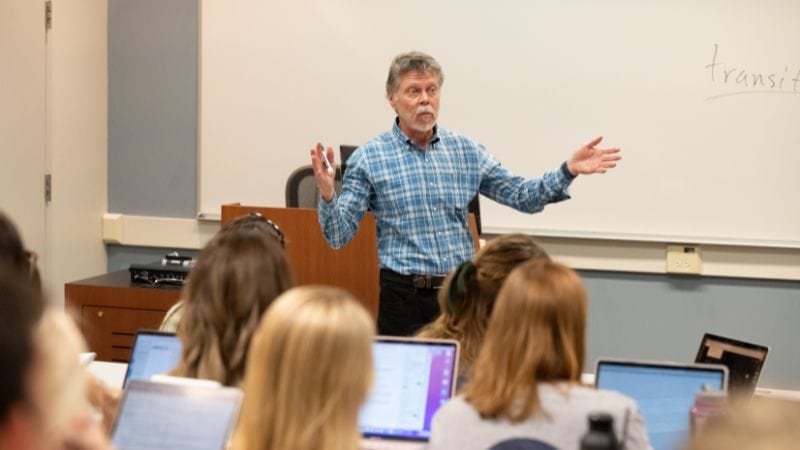
This course presents lectures and case studies to give students a clear understanding of free-market economic principles necessary to report news stories. The course is taught by an economist with weekly guest lectures by the former White House Correspondent for USA Today. The course will examine economic policy and how it relates to reporting accurate news stories. Students will learn about the interrelated nature of politics and economics and will learn to think critically about society, the market, and government.
Faculty
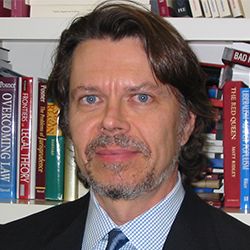
Donald Boudreaux, George Mason University
Professor, Economics for the citizen
Professor Donald J. Boudreaux was the Chairman of the Department of Economics at George Mason University in Fairfax, Virginia, from August 2001 to August 2009. Previously, he was president of the Foundation for Economic Education (1997-2001), Associate Professor of Legal Studies and Economics at Clemson University (1992-1997), and Assistant Professor of Economics at George Mason University (1985-1989).
During the Spring of 1996 semester, he was an Olin Visiting Fellow in Law and Economics at the Cornell Law School. He earned his Ph.D. in economics from Auburn University (1986) and his law degree from the University of Virginia (1992).
He has lectured, in the United States, Canada, Latin America, and Europe, on a wide variety of topics, including the nature of law, antitrust law and economics, and international trade. He is published in The Wall Street Journal, Investor’s Business Daily, Regulation, Reason, Ideas on Liberty, The Washington Times, The Journal of Commerce, the Cato Journal, and several scholarly journals such as the Supreme Court Economic Review, Southern Economic Journal, Antitrust Bulletin, and Journal of Money, Credit, and Banking.
“The class, taught by Dr. Donald Boudreaux, has been enriching. Before this class, I had never taken an economics course before, and I feel that the material taught to me in this course has opened my eyes to a completely different perspective, an economic perspective that I had not been taking account of.”
Daniel Zeidan, Western Kentucky University
Department of Education Intern
Course Description
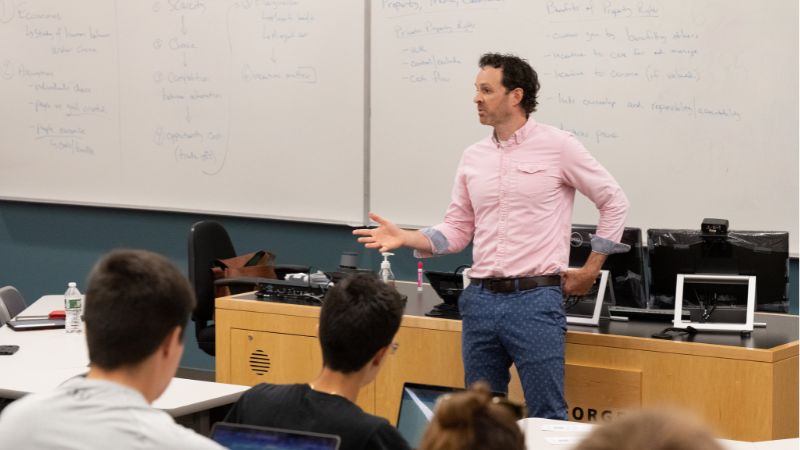
This course introduces students to the role of economics in the context of policy-making. Students will learn how to apply economic thinking and analysis to a variety of public policy issues. Examples will be drawn from current Administration policy initiatives, government economic policy, and ongoing legislative battles in Congress. Students will examine basic economic concepts and the market economy. They will be introduced to public choice theory and analyze various policy issues through the lens of economics. View a sample syllabus.
Faculty
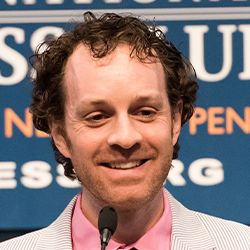
Chris Coyne, George Mason University
Professor, Economic Problems and public Policies
Christopher Coyne is a Professor of Economics at George Mason University and the Associate Director of the F. A. Hayek Program for Advanced Study in Philosophy, Politics, and Economics at the Mercatus Center. He is the Co-Editor of The Review of Austrian Economics and The Independent Review. He also serves as the Book Review Editor for Public Choice.
Coyne is the author or co-author of Tyranny Comes Home: The Domestic Fate of U.S. Militarism (2018, Stanford University Press), Doing Bad by Doing Good: Why Humanitarian Action Fails (2013, Stanford University Press), Media, Development and Institutional Change (2009, Edward Elgar Publishing), and After War: The Political Economy of Exporting Democracy (2007, Stanford University Press).
He is also the co-editor of In All Fairness Liberty, Equality, and the Quest for Human Dignity (2019, Independent Institute), Exploring the Political Economy and Social Philosophy of James M. Buchanan (2018, Rowman & Littlefield International), Interdisciplinary Studies of the Market Order: New Applications of Market Process Theory (2017, Rowman & Littlefield International), Future: Economic Peril or Prosperity? (2016, Independent Institute), The Oxford Handbook of Austrian Economics (2015, Oxford University Press) and The Handbook on the Political Economy of War (2011, Edward Elgar Publishing).
In addition, Coyne has authored numerous academic articles, book chapters, and policy studies.
In 2016 he was selected as a recipient of George Mason’s University Teaching Excellence Award.
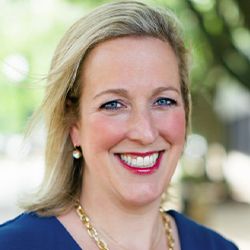
Anne Bradley
Professor, Economic Problems and public Policies
Dr. Anne Rathbone Bradley is the George and Sally Mayer Fellow for Economic Education and the academic director at The Fund for American Studies. Through this position, Dr. Bradley works to enhance the impact and reach of TFAS economic education programs through courses, seminars, videos and social media. She also delivers lectures around the country and oversees curriculum development and evaluation for economics courses.
Previously, Dr. Bradley served as the vice president of economic initiatives at the Institute for Faith, Work & Economics, where she continues research toward a systematic biblical theology of economic freedom. In addition to her work with TFAS, she is a professor of economics at The Institute for World Politics and Grove City College. She is a visiting professor at George Mason University and has previously taught at Georgetown University and Charles University in Prague. She is currently an Acton Affiliate scholar and a visiting scholar at the Bernard Center for Women, Politics & Public Policy. She is a lecturer for the Institute for Humane Studies and the Foundation for Economic Education.
“ECON 309 has been an eye-opening experience. The lectures are a great exercise in economic thought that challenge me to approach public policy in a more practical way. As my roommate and I discussed and debated current events, I often found myself referring to the lectures and using the language of the economist to make my points. This course has really equipped me with a set of tools that I look forward to using throughout my career.”
Ervin Bryant, Prairie View A&M University
National Campus Leadership Council Intern
Course Description
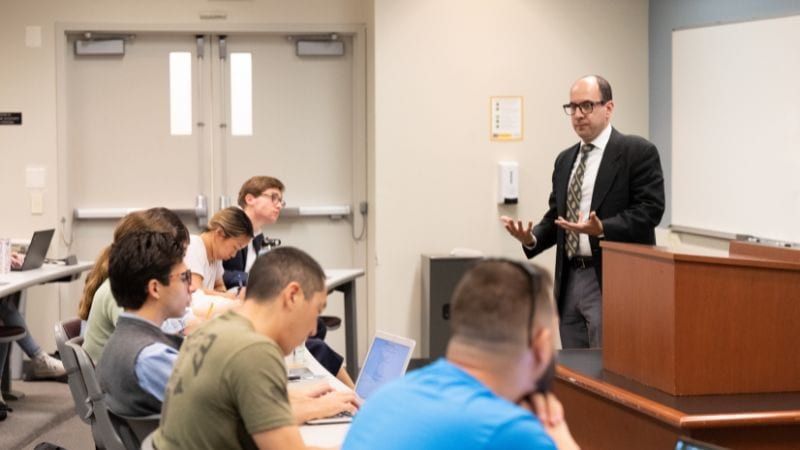
In this international economics course, students will examine the problems and achievements of formerly communist and socialist countries including China, Eastern European countries, Russia and other countries of the former Soviet Union as they transition to more market-oriented economies.
Faculty
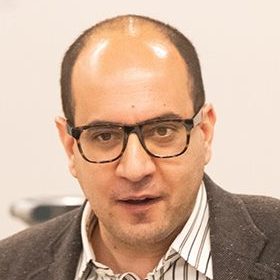
Rosolino Candela, George Mason University
PROFESSOR, Economies in Transition
Rosolino Candela is a Senior Research Fellow and Associate Director of Academic and Student Programs, as well as a Senior Fellow of the F.A. Hayek Program for Advanced Study in Philosophy, Politics and Economics at the Mercatus Center.
Prior to George Mason University, Candela taught in the Department of Economics at Brown University, where he was also a Postdoctoral Research Associate in the Political Theory Project. He was also a Visiting Professor of Economics at Universidad Francisco Marroquin, and a Visiting Fellow in the Department of Political and Social Sciences at the European University Institute.
In 2016 and 2019, Candela was nominated for the George Mason University Career Connection Faculty Award.
“I feel like I’ve gained another lens through which to see the world. It’s changed the way I think about the problems that we’re currently facing and forced me to reevaluate my political philosophy. I’ve really enjoyed being challenged and I wish I had more time with these professors.”
Lydia Laramore, Spelman College
Association for Diplomatic Studies & Training Intern
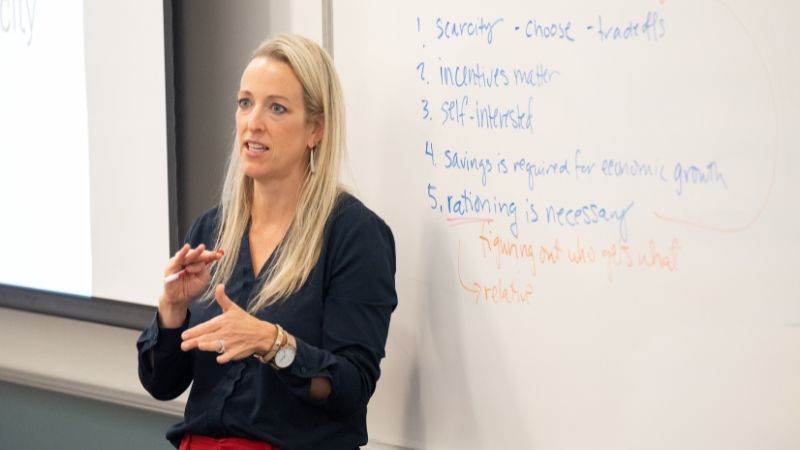
TFAS offers an optional Economics Boot Camp seminar during the first week of the program. This is an ideal way for students who have never taken an economics class to get up to speed with economic principles and the economic way of thinking. The boot camp will be comprised of two short in-person seminars with professor instruction and interactive activities. There also will be a few brief online videos for students to watch. Dr. Anne Bradley, who holds a Ph.D. in Economics and serves as the TFAS Academic Director, will lead the seminar.
Students may indicate their interest in participating in the Bootcamp at the time of enrollment.

Anne Bradley
TFAS ACADEMIC DIRECTOR
Dr. Anne Rathbone Bradley is the George and Sally Mayer Fellow for Economic Education and the academic director at The Fund for American Studies. Through this position, Dr. Bradley works to enhance the impact and reach of TFAS economic education programs through courses, seminars, videos and social media. She also delivers lectures around the country and oversees curriculum development and evaluation for economics courses.
Previously, Dr. Bradley served as the vice president of economic initiatives at the Institute for Faith, Work & Economics, where she continues research toward a systematic biblical theology of economic freedom. In addition to her work with TFAS, she is a professor of economics at The Institute for World Politics and Grove City College. She is a visiting professor at George Mason University and has previously taught at Georgetown University and Charles University in Prague. She is currently an Acton Affiliate scholar and a visiting scholar at the Bernard Center for Women, Politics & Public Policy. She is a lecturer for the Institute for Humane Studies and the Foundation for Economic Education.
Optional Elective Courses
Maximize your time in Washington and enroll in an elective course in addition to your core class! Choose the course that best fits your academic interests and background.
Among the elective classes are two internship seminar sections. In addition to a 2-hour class meeting once a week, these courses provide credit for the internship experience through GMU. It is not required to take one of these courses to receive credit for your internship – please check with your home institution for their specific policy.
Course Description
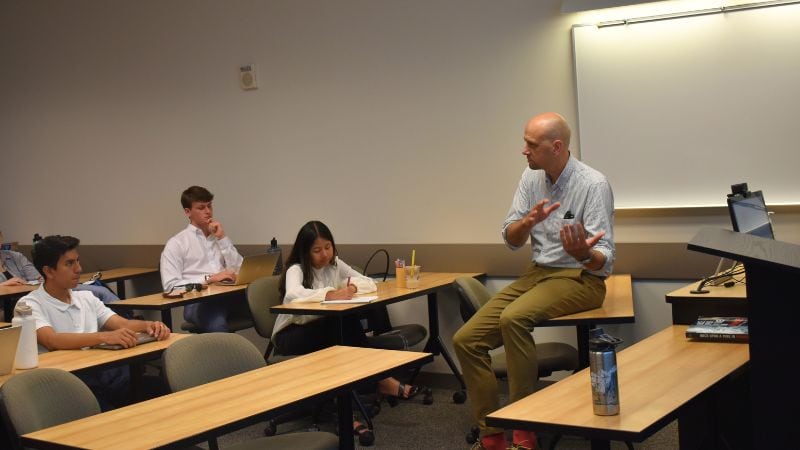
This course is a must for any student wanting to closely examine U.S. foreign policy while they are living and working in the seat of our nation’s government. The discussion-based class provides historical and present-day perspectives on American foreign policy. It will examine how these views will influence the future of American diplomacy and the global perception of the United States. During the course, students will be engaged in a series of “great episodes” in American foreign policy, aiming at relating them to current problems. The course will also examine national security policy since 9/11. This course is open to all students with an interest in foreign policy or international affairs.
Faculty
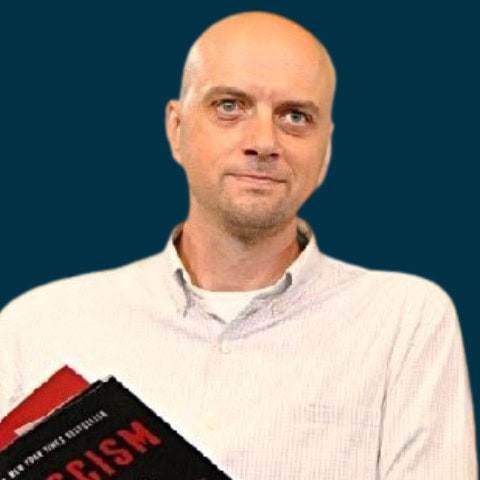
Milorad Lazic, George Washington University
PROFESSOR, U.S. FOREIGN POLICY
Dr. Milorad Lazic received his Ph.D. in history from the George Washington University. He specializes in the history of U.S. foreign relations during the Cold War. Milorad’s book, Unmaking Détente: Yugoslavia, the United States, and the Global Cold War, 1968–1980, was published in July 2022 with Lexington Books. His articles and reviews appeared in Nationalities Papers, Passport: The SHAFR Review, and Journal of Military History.
Currently, Milorad is an adjunct professor at the US Naval Academy and has previously taught at the George Washington University, Trinity Washington University, and Hood College.
Course Description
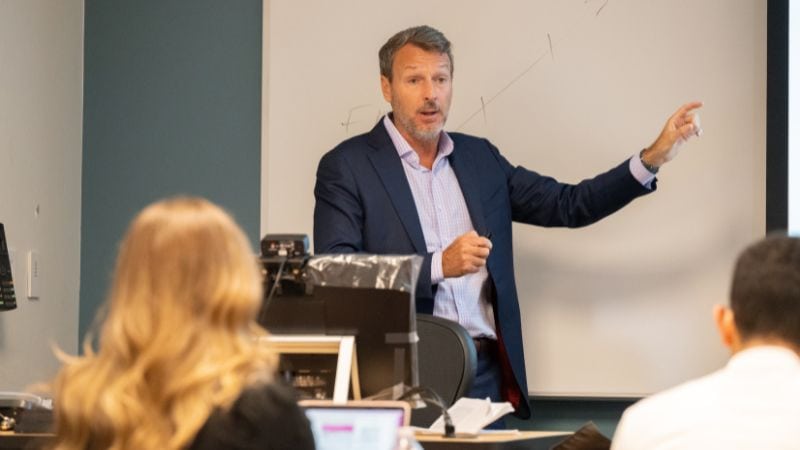
This course is the perfect complement to any internship in the nation’s capital – where politics and the federal government are front-page news every day. This interactive course will explore the development of the American political tradition from the New England Puritan settlement to the Founding Era and the conclusion of the Civil War. The class will also examine how the role of government has changed, how people’s relationship to the government has evolved, and what this means for the future. Students will discuss the many ways in which Enlightenment liberalism developed alongside alternatives such as classical republicanism and Christianity. Students will explore these contradictory impulses in American political culture and discuss ways that they can be reconciled.
Faculty
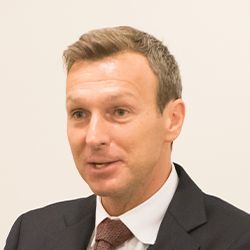
Richard Boyd, Georgetown University
PROFESSOR, AMERICAN POLITICAL THOUGHT
Richard Boyd is an associate professor of government at Georgetown University. His research interests include the intellectual history of liberalism, civil society and pluralism, economic and sociological theory, post-colonialism, and the theory and practice of immigration and citizenship policies in the United States. Before coming to Georgetown in 2007, Boyd taught at the University of Chicago, University of Pennsylvania, University of Wisconsin-Madison, and Deep Springs College.
Boyd is the author of Uncivil Society: The Perils of Pluralism and the Making of Modern Liberalism. His articles have appeared in Review of Politics, Journal of Politics, Political Theory, History of Political Thought, Polity, European Journal of Political Theory, Urban Studies, Social Philosophy & Policy, and other journals. He is currently completing a book-length manuscript titled “Membership and Belonging: On the Boundaries of Liberal Political Theory.”
Course Description
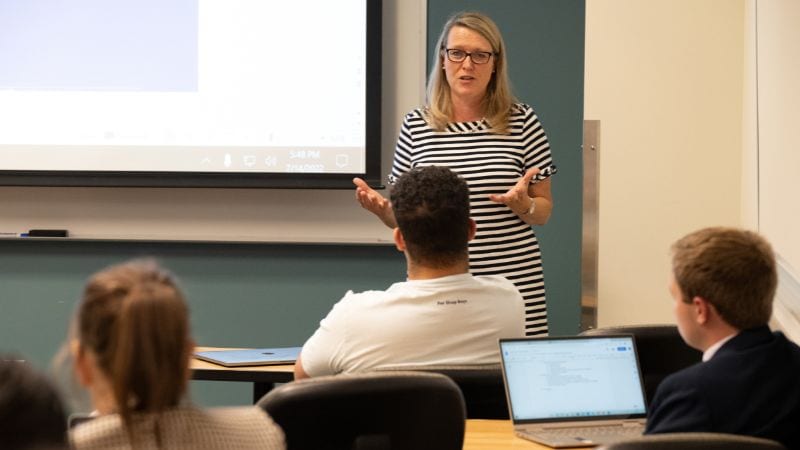
Students will meet once a week for an interactive seminar that will examine the practical side of the workplace. Led by a former Congressional Chief of Staff and Senior Advisor at the Department of Labor, this course will explore current policy issues affecting professionals working in your field. High-level guest speakers will cover pressing issues such as national security, Supreme Court cases and pending federal legislation. Students have priority access to professional development training that is designed to give them the tools to succeed in today’s workplace. The seminar is a graded course that incorporates required readings, written assignments, tests/quizzes and group projects. All students are eligible to enroll in this optional course; enrollment is not required to participate in the program or an internship.
Faculty
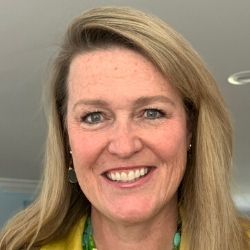
Karen Czarnecki, Mercatus Center at George Mason
PROFESSOR, INTERNSHIP SEMINAR – PUBLIC POLICY + INTERNATIONAL AFFAIRS
Karen M. Czarnecki currently serves as the Vice President of Outreach at the Mercatus Center. Previously she served as the Chief of Staff to Rep. Mike Kelly and as a senior advisor to U.S. Secretary of Labor Elaine L. Chao. She joined the Labor Department in June of 2001, and in June 2003 she was appointed Director of the Office of the 21st Century Workforce. In addition, she served as Deputy Assistant Secretary of Labor for Intergovernmental Affairs, giving her responsibility for outreach to state and locally-elected officials. Czarnecki received her BA and juris doctorate degrees from the Catholic University of America and is also an alumna of the Public Policy and Economics program.
Weekly Guest Lecture Series
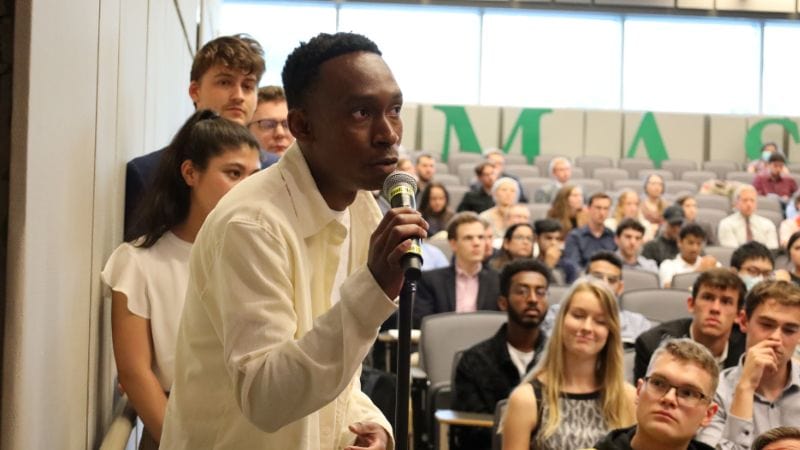
Weekly guest lectures give you a chance to learn, question, and often exchange business cards with some of the city’s best public policy, international affairs and economics experts, as well as journalists, public relations and communications professionals in D.C.
These lectures are designed to complement what you are learning in your classes and internship. Covering a wide variety of topics, the events are lively, interactive and challenging.
Sample guest lecture topics and speakers have included:
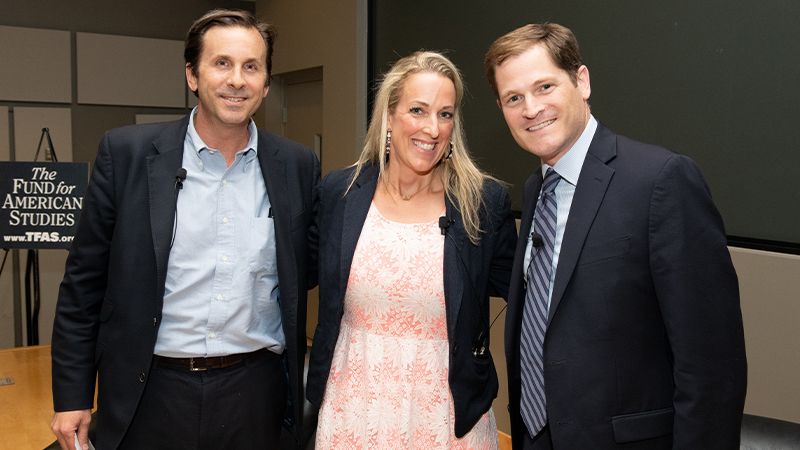
- The Chilean Experience: Defeating Poverty with Liberty: Jose Pinera, former Chilean Minister of Labor and Social Security
- 2020 Polling + the Presidential Outlook: Chris Wilson, CEO of WPA Intelligence
- State vs. Federal Government: Kevin Turner, Overseas Private Investment Corporation
- Tackling National Debt + the Federal Deficit Debate: Seth Hanlon, Center for American Progress + John Tamny, FreedomWorks
- Immigration Policy: Alex Nowrasteh, Cato Institute
- Tariffs and American Jobs Debate: Alan Tonelson, Founder, RealityChek and Donald Boudreaux, GMU
- Leadership and Character in Policy-making: David Bobb, Bill of Rights Institute
- National Security Strategy and Resourcing: Colonel John W. Wagner, National Defense University
- Supreme Court Roundup: Ilya Shapiro, Cato Institute
Sample guest lecture topics and speakers have included:
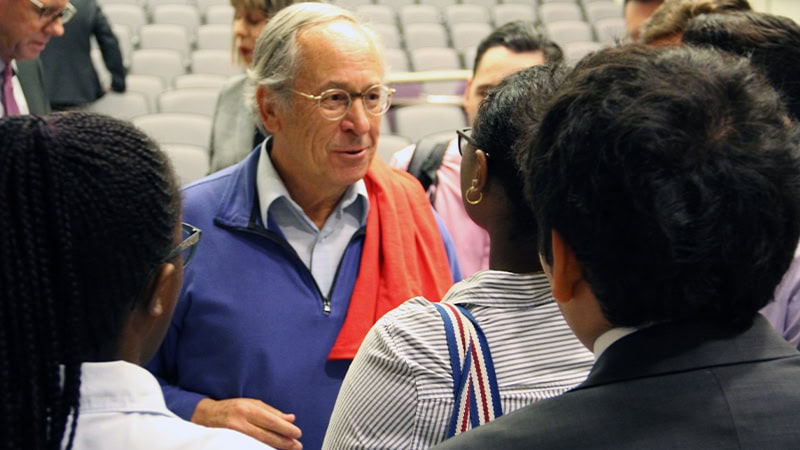
- Restraint vs. Primacy in U.S. Foreign Policy: Robert Lieber, Professor of Government and International Affairs, Georgetown University
- Constitutional and Legal Issues in U.S. Foreign Policy: Chris Preble, Vice President for Defense and Foreign Policy, Cato Institute
- The Economics of U.S. Foreign Policy: Linda Bilmes, Daniel Patrick Moynihan Senior Lecturer in Public Policy, Harvard Kennedy School
- The Chilean Experience: Defeating Poverty with Liberty: Jose Pinera, former Chilean Minister of Labor and Social Security
- U.S.-Russia Foreign Policy: David Satter, Senior Fellow, Hudson Institute + Thomas Wright, Director, Center on the U.S. and Europe, Brookings Institution
- U.S.-China Policy: Abigail Grace, Research Associate, Asia-Pacific Security Program, Center for New American Security + Harry Kazianis, Director of Defense Studies, Center for the National Interest + Alison Szalwinski, Director of Political and Security Affairs, National Bureau of Asian Research
- U.S.-Iran Policy: Tzvi Kahn, Senior Iran Analyst, Foundation for Defense of Democracies + Emma Ashford, Research Fellow, Cato Institute
- Afghanistan Policy: Gilman Barndollar, Military Fellow-in-Residence, Catholic University of America
- Syria in Review: Faysal Itani, Senior Fellow, Atlantic Council
- Escaping North Korea: Grace Jo, Vice President, North Korea in the USA
Sample guest lecture topics and speakers have included:
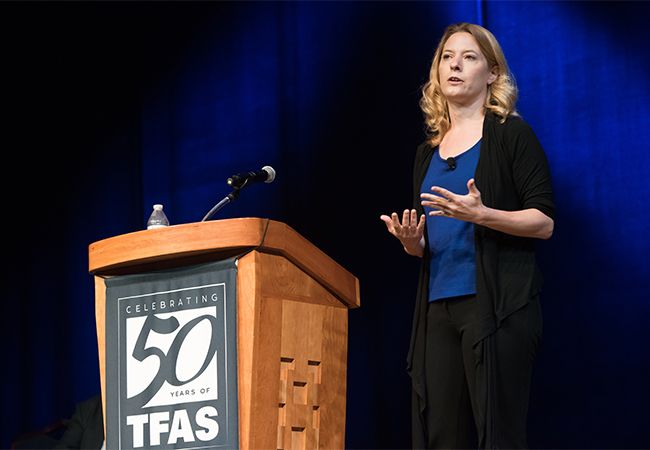
- Life of a Foreign Correspondent: Suzanne Kianpour, BBC News
- Reporting from a War Zone: Christian Galdabini, Freelance Photographer
- The ABC’s of Covering Capitol Hill: Matt Laslo Capitol Hill Reporter
- The White House Beat: Francesca Chambers, The Daily Mail and Jenny Vazquez WRC TV NBC 4
- Covering the 9-11 Attacks in NYC: A Reporter’s Story: Clemente Lisi, Professor at King’s College & Former New York Post Reporter
- The Military and Defense Beat: Haley Britzky, Task & Purpose Magazine and Sarah Sicard, Defense News
- From News to Talk: The Expansion of Opinion and Commentary in U.S. Journalism: Professor Kimberly Meltzer, Marymount University
- How to Cover Economic and Business Stories: John Merline, Investor’s Business Daily
- PR Options in Washington, D.C.: Randy DeCleene, kglobal
- How to Succeed in Journalism and in Life : Jim Forbes, Director of Communications, Prison Fellowship Ministries
Sample guest lecture topics and speakers have included:
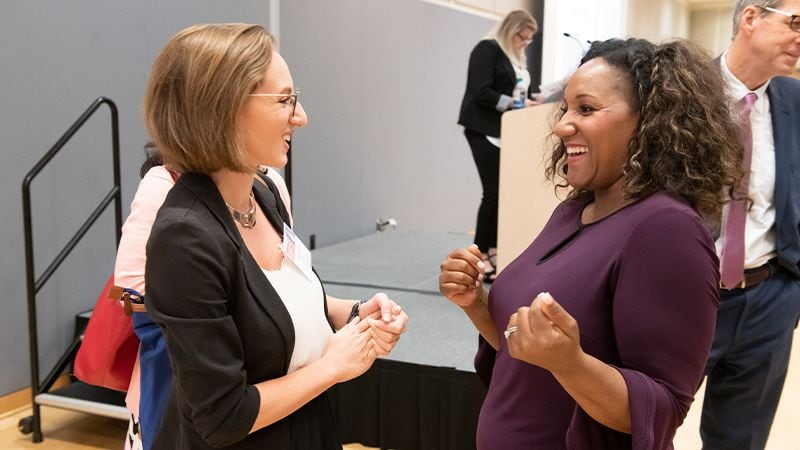
- The ABC’s of Lobbying: Brian Donahue, American Cancer Society
- Corporate Cronyism: Tim Carney, The Washington Examiner
- An Industry Deep Dive: Julie Alsup, International Paper
- From Lobbying to Presidential Appointment: Ken Barbic, United States Department of Agriculture
- Trade Briefing: Shihoko Goto, The Globalist
- The Chilean Experience: Defeating Poverty with Liberty: Jose Pinera, former Chilean Minister of Labor and Social Security
- Welcome to Lobbying: Steve Chaudet, Lockheed Martin
- Governing and Lobbying: Ado Machida, International Stability Operations Association
- Professional Standards & Ethics of Lobbying: Paul Kanitra, Lobbyit.com
- Overview of U.S. Trade Policy: Dao Le, U.S. Department of Commerce
